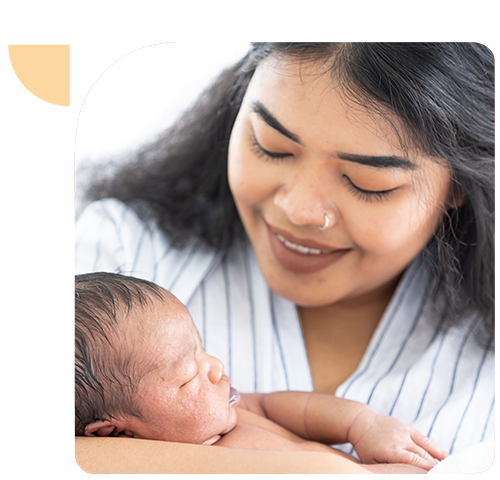Sleep in the Postpartum Period
Getting enough sleep can:
-
Support mental and physical health.
-
Help with concentration, memory, and decision-making.
-
Help with stress management.
-
Support positive communication and relationships.
Caring for a new baby, body changes, and adjusting to parenthood can all make it harder to get good sleep.
If you're struggling with sleep, you're not alone. It's normal for sleep quality to change after giving birth, but there are ways to make it easier. Here are some tips to help you rest better.
General Sleep Tips
-
Sleep in a cool, dark, and quiet room.
-
Stick to a relaxing bedtime routine to help you wind down from the day.
-
Avoid using screens before bed.
-
Try screen alternatives like journaling, stretching, reading a book, listening tonature sounds, etc.
-
Move your body during the day. Drink plenty of water during the day, but reduce the amount before bed to avoid frequent urination.
-
Avoid caffeine, spicy foods, and heavy meals before bedtime to prevent acid reflux.
-
If you feel stressed or overwhelmed, don't be afraid to share your thoughts with a trusted person and/or get professional help.
-
Don't force yourself to sleep. If you have trouble falling asleep, get out of bed and do a calming activity until you feel sleepy.
-
Sleep in a comfortable position.
-
Give yourself a wind down period before bed, with dim lighting if possible.
Sleep challenges after having a baby are normal, but sometimes they signal a bigger health issue. Talk to your provider if you are experiencing more severe sleep problems, such as:
-
Insomnia symptoms, including difficulty falling asleep, staying asleep, or waking much earlier than wanted.
-
Sleep apnea symptoms, including snoring, breathing pauses, or gasping, and daytime sleepiness.
-
Unpleasant, restless feelings in your legs that are worse at night and that get better with movement.
Practice Safe Sleep
-
The American Academy of Pediatrics recommends that infants sleep in the same bedroom as their parents for at least the first six months of life.
-
Place infants on their backs for sleep in their own sleep space with no other people.
-
Use a crib, bassinet, or portable play yard with a firm, flat mattress and a fitted sheet. Avoid sleeping on a couch or armchair or in a seating device, like a swing or car safety seat (except while riding in the car).
-
Keep loose blankets, pillows, stuffed toys, bumpers, and other soft items out of the sleep space.
-
Breastfeed if possible and avoid smoking.
Get Support
From your partner, family, friends, or members of your health care team, like doulas or home visiting nurses.
-
If you can, let others help with feedings, diaper changes, or household tasks so you can rest.
-
If support is limited, small changes like preparing meals in advance or a simple sleep routine can make a difference.
-
Your provider or others on your care team may have ideas about ways to get more support.
Make nighttime care easier by keeping your baby in a crib or safe sleep space nearby, storing supplies within reach, and using soft lighting for nighttime needs.
Feed With Breastmilk, if Possible
-
Parents who feed their infant exclusively with breastmilk sleep longer than those who supplement with formula.
Support your baby’s sleep. At the beginning, “sleep when the baby sleeps” is a good idea. With time, you can work on making routines that help baby sleep better. See Supporting Baby’s Sleep for more.
Sources: La Clinica and Aces Aware
Center for Youth Wellness and ZERO TO THREE – Good Sleep Habits. (2019).
ACEs Aware. https://www.acesaware.org/wp-content/uploads/2019/12/5-Good-Sleep-Habits-English.pdf
Rachel Y. Moon, Rebecca F. Carlin, Ivan Hand, THE TASK FORCE ON SUDDEN INFANT DEATH SYNDROME AND THE COMMITTEE ON FETUS AND NEWBORN; Sleep-Related Infant Deaths: Updated 2022 Recommendations for Reducing Infant Deaths in the Sleep Environment. Pediatrics July 2022; 150 (1): e2022057990. 10.1542/peds.2022-057990
Witkowska-Zimny M, Zhyvotovska A, Isakov R, Boiko DI, Nieradko-Iwanicka B. Maternal Sleeping Problems Before and After Childbirth - A Systematic Review. Int J Womens Health. 2024;16:345-371 https://doi.org/10.2147/IJWH.S446490

